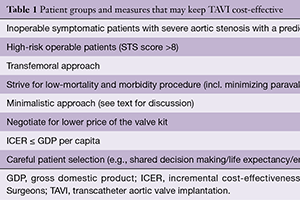Transcatheter aortic valve implantation economics: a grisly reality
Abstract
Transcatheter aortic valve implantation (TAVI), an established treatment for inoperable and high-risk operable symptomatic patients with severe aortic stenosis with growing numbers of procedures and expanding indications, is an expensive therapy. Cost-effectiveness analyses rely on the value of the incremental cost-effectiveness ratio (ICER), which is the difference in cost between two possible interventions, divided by the difference in their effect. Several analyses have demonstrated that TAVI is cost-effective with an acceptable ICER for the inoperable patient alone and only via the iliofemoral route, while TAVI is more costly and is either less or equally effective as surgery in high-risk operable patients. When use of TAVI is extended to include a larger number of patients suitable for surgery, the overall results become less favorable. Acceptable ICERs should practically equate to the value of the gross domestic product (GDP) per capita in each country, however, the cost of the TAVI kit alone already exceeds the GDP per capita of all moderate- and low-income countries. An overview of the current cost-efficacy issues of TAVI is presented and this grisly reality is discussed, which may hopefully be improved in the future.
Cover






